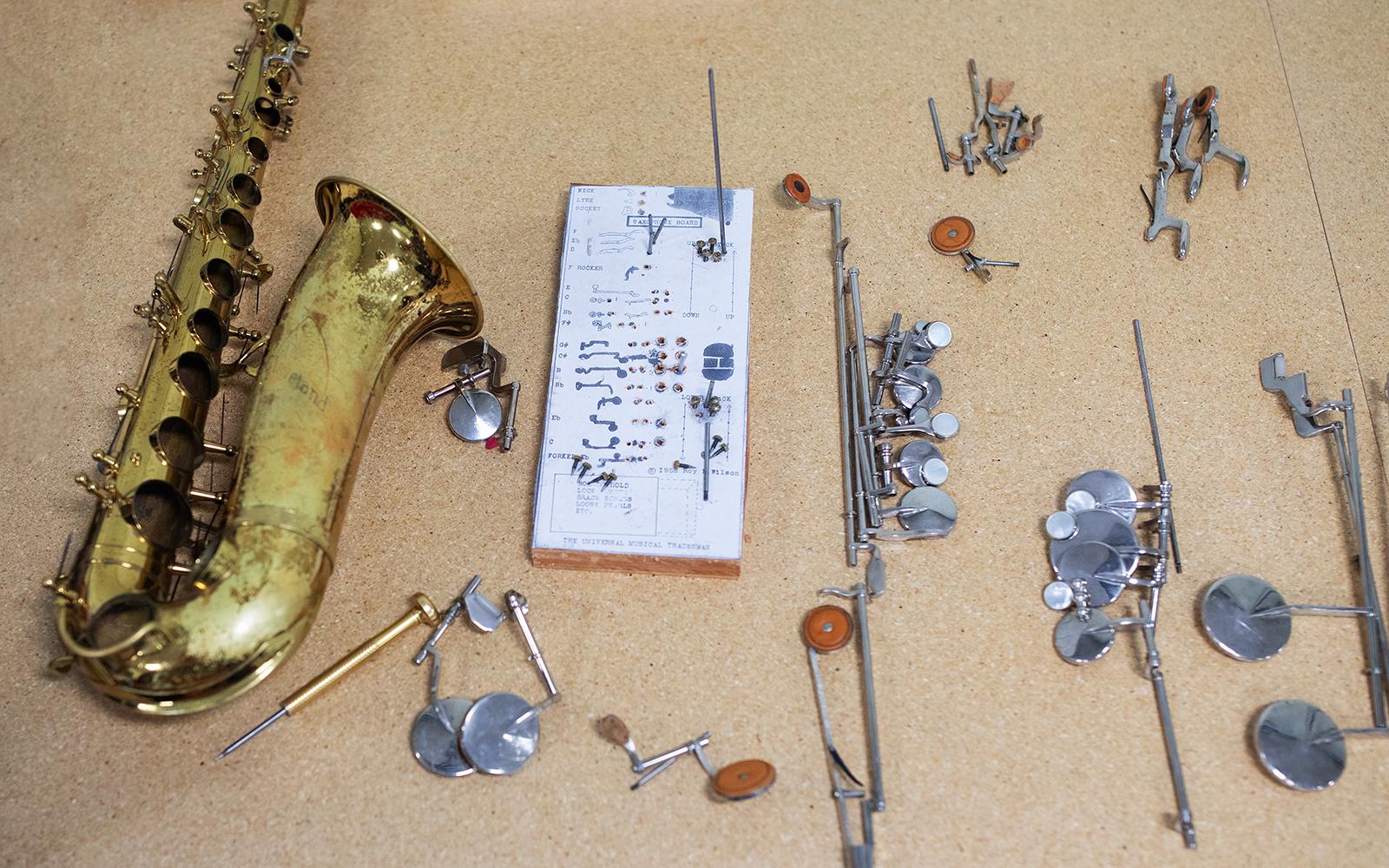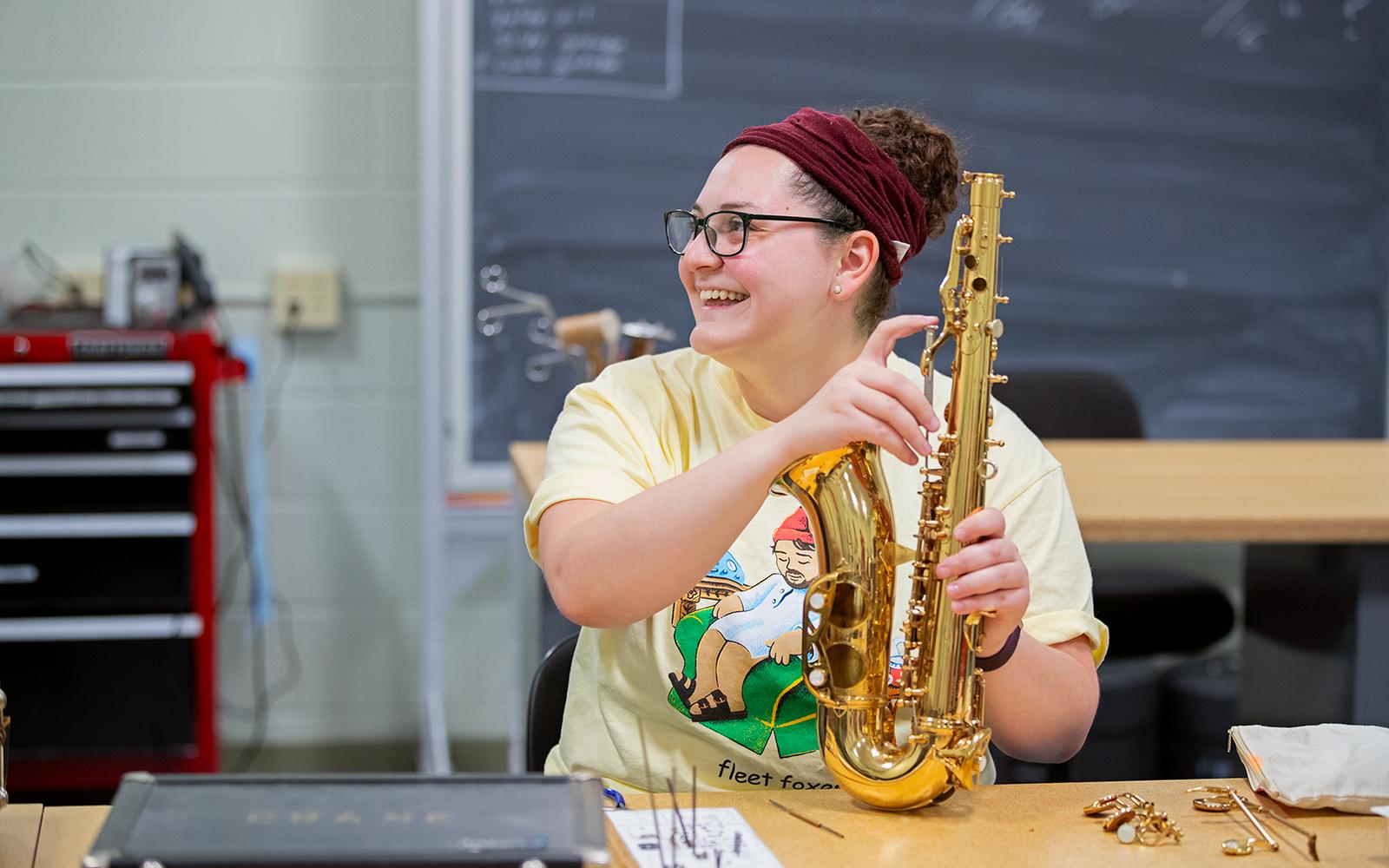The Puzzle of Instrument Repair
Staring down at a table full of loose instrument parts, 12 graduate students have been solving puzzles this summer—attaching keys with tiny screwdrivers, corking clarinets and saxophones, replacing woodwind pads, and making sense out of perceived chaos in Crane’s new instrument repair lab.

As Elira Mavraj ’22 & ’24 carefully assembles a saxophone on the worktable in front of her, she reflects on her first year as a music teacher. “After teaching middle school band this year, I've been thinking back to times when I had to send my students’ instruments out for repair and how I could have easily repaired them myself with the knowledge I have now. The instrument repair class has undoubtedly been one of the most valuable classes I've taken at Crane,” she said.

“I've absolutely loved Crane's master's degree program in music education so far! I chose to pursue my master's degree because I loved my undergraduate experience at Crane and felt that there was still more I could learn from our faculty. The convenience and affordability of summer courses was also a deciding factor so that I could still teach during the school year.”
Music Education Major
This summer, Mavraj and a cohort of other music educators, many of whom are already working as music teachers around the state, are mastering the technical skills to repair instruments in Miles DeCastro’s Band Instrument Maintenance for Music Educators course.
“It’s something that rarely gets covered, but it’s going to come up when their star soloist’s instrument stops working ten minutes before a concert,” said DeCastro, the musical instrument technician at Crane. “Everybody is going to be looking at them and expecting them to know how to fix it, even though most educators come out of school with no training in it.”
As the lab fills with laughter and students collaborate on their instrument repairs, one hand after another is raised in the air for DeCastro’s assistance. He wastes no time, zipping around the room to help one student after another. “I always tell the students that we focus on the big five: flute, clarinet, saxophone, trumpet, and trombone. It’s what most teachers encounter, 90 percent of their work is teaching those five instruments, as well as 90 percent of the repairs,” DeCastro explained.
DeCastro brings years of professional experience to his students. After graduating with a bachelor’s degree in music education from Mansfield University in 2005, he lined up a job as a band director in the Baltimore City Public School system. While in Baltimore, he also worked for a retailer selling musical instruments, where he first discovered his passion for the craft. “Seeing the instruments get repaired sparked my interest, so I looked into ways to make it a career,” he said.
Choosing one of only three instrument repair schools in North America, he moved to Seattle, Washington, to complete his certificate of Band Instrument Repair Technology from Renton Technical College—a program that laid the foundation for his current position at Crane. After working at two more instrument product stores in Nevada and California, he was offered a position at Crane in 2016 as their instrument repair technician.
“I had my eye on college jobs because there are only about six colleges in the country that have this position. I think a lot of students who go to school here don’t realize that it’s very unusual to have an in-house repair technician. Pretty much all year I’m repairing instruments. You never know what kind of problems will pop up,” he said.
DeCastro’s expertise made an immediate impact at the College when he was hired. During his first year, he helped orchestrate the purchase of an ultrasonic instrument cleaning tank, a 90-gallon water tank with a mild cleaning agent that uses sound waves to remove debris from instruments. “Before these tanks were becoming more common, people were using really harsh chemicals that were not very good for the people, instruments, or earth,” he explained. “I started lobbying for it during the interview.”
Outside of Crane, DeCastro recently received his MBA from Clarkson University and just finished serving three terms as president of the National Association of Professional Band Instrument Repair Technicians. He has attended every national conference since becoming a member in 2007, while making presentations and hosting clinics at the regional, national, and international levels.
Back in the classroom, DeCastro leans on his years of professional experience to help Mavraj, Caroline Zanetti ’18 & ’23, Will Hope ’24, Bethany Cripps ’24 and other highly motivated students mastering instrument repair this summer. “Typically, I have a lot of music education students who take the course, but I encourage anybody interested in finding out more about instrument repair to take it,” he said. “I get feedback all the time with many students saying, ‘This is the most useful class I’ve taken.’”
For Mavraj, whose primary instrument is the trumpet, the class has been an eye-opening experience that will positively impact her role as an educator. “Next year I'll be teaching elementary general music and chorus at a low-income district that does not currently have a band program at the elementary level,” she said. “These new sets of skills are not only important for all music teachers, but especially for teachers who may be a student's only source of getting their instrument repaired, ultimately making band more accessible for their communities.”
Article and Photos by Jason Hunter
